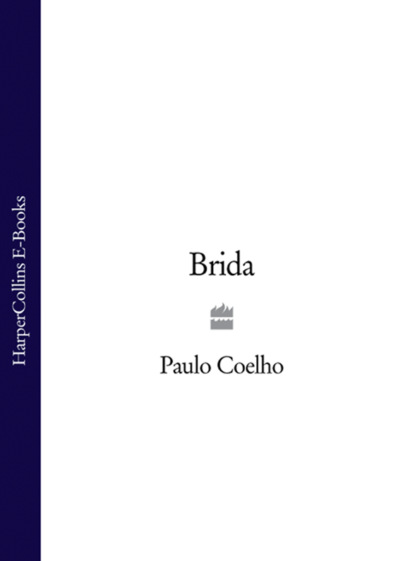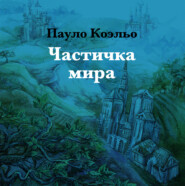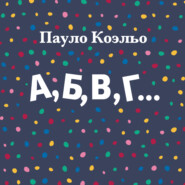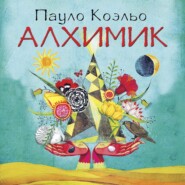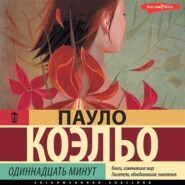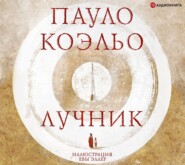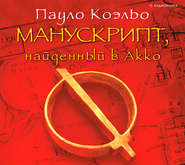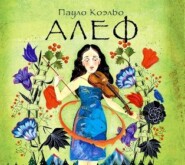По всем вопросам обращайтесь на: info@litportal.ru
(©) 2003-2024.
✖
Brida
Автор
Год написания книги
2018
Настройки чтения
Размер шрифта
Высота строк
Поля
She chose a fairly inexpensive restaurant (#ulink_3bce785e-482a-5aff-8c9f-16267935024f), because he always insisted on paying the bill, despite the fact that he earned far less as a research assistant to a physics professor at the university than she earned as a secretary. It was still summer, and they sat out at one of the tables on the pavement, by the river.
‘I want to know when the spirits are going to let me sleep with you again,’ said Lorens good-humouredly.
Brida looked at him tenderly. She had asked him not to come to her apartment for two weeks, and he had agreed, protesting just warmly enough for her to know how much he loved her. In his way, he, too, was seeking to understand the mysteries of the Universe, and if, one day, he were to ask her to stay away from him for two weeks, she would have to say ‘Yes’.
They dined unhurriedly and largely in silence, watching the boats crossing the river and the people walking past on the pavement. The bottle of white wine on the table was emptied and replaced by another. Half an hour later, they had pushed their two chairs together and were sitting, arms around each other, gazing up at the starry summer sky.
‘Just look at that sky,’ said Lorens, stroking her hair. ‘What we’re looking at now is how the sky would have appeared thousands of years ago.’
He had told her the same thing on the day they first met, but Brida chose not to interrupt him – this was his way of sharing his world with her.
‘Many of those stars have already died, and yet their light still fills the Universe. Other stars were born far away, and their light has not yet reached us.’
‘So no one knows what the real sky looks like?’ She had asked that same question on their first meeting too, but it was good to repeat such delicious moments.
‘We don’t know. We study what we can see, but what we see is not always what exists.’
‘I want to ask you something. What are we made of? Where did the atoms that make up our bodies come from?’
Lorens looked up at the ancient sky and said:
‘They were created along with these stars and this river. In the first second of the Universe’s existence.’
‘So after that first moment of Creation, nothing more was added.’
‘No, nothing. Everything moved and continues to move. Everything was transformed and continues to be transformed. But all the matter that exists in the Universe now is the same matter from all those billions of years ago, and not so much as a single atom has been added.’
Brida sat studying the movement of both river and stars. It was easy to see the river flowing across the Earth, but it was hard to see the stars moving in the sky. And yet both were moving.
‘Lorens,’ she said at last, after a long silence during which they both watched a boat passing. ‘Let me ask what might seem an absurd question: is it physically possible that the atoms that make up my body could have been in the body of someone who lived before me?’
Lorens stared at her in amazement.
‘What do you mean?’
‘What I said. Is such a thing possible?’
‘They could be in plants or insects or they could have turned into helium molecules and be out there somewhere, millions of miles from Earth.’
‘But is it possible that the atoms that made up the body of someone who died could be in my body and in someone else’s body?’
He said nothing for a moment, then said:
‘Yes, it is.’
The sound of distant music reached them. It came from a barge crossing the river, and even from far away, Brida could make out the silhouette of a sailor framed in a lighted window. It was a tune that reminded her of her adolescence; it brought back memories of school dances, the smell of her bedroom, the colour of the ribbon she used to use to tie up her pony-tail. Brida realised that Lorens had never before considered the question she had asked him, and was perhaps, at that moment, wondering if his own body contained the atoms of Viking warriors, of volcanic explosions, or of prehistoric animals that had mysteriously disappeared.
But her thoughts were elsewhere. All she wanted to know was this: had the man so tenderly embracing her once been part of herself?
The barge came closer and the music began to fill the air around them. Conversations on the other tables stopped too, everyone eager to find out where the sound was coming from, because everyone had once been an adolescent, attended school dances and had dreams full of stories about warriors and fairies.
‘I love you, Lorens.’
And Brida hoped against hope that this young man who knew so much about the light from the stars contained a little of the person she had once been.
‘It’s no good, I can’t do it (#ulink_f8554f8d-5e12-5cfc-b38a-27714b2a2d97).’
Brida sat up in bed and felt for the packet of cigarettes on the bedside table. Going against all her normal habits, she decided to smoke a cigarette before breakfast.
It was another two days until she was due to meet Wicca again. She knew that, during the last two weeks, she had tried her hardest. She had channelled all her hopes into the method of spreading the cards taught to her by that attractive and mysterious woman and she had struggled hard not to disappoint her, but the cards refused to reveal their secrets.
Each time she had finished the exercise on the previous three nights, she had felt like crying. She felt vulnerable and alone and had a sense that a great opportunity was slipping through her fingers. Once again, she felt that life was not treating her as it treated other people: it gave her every chance to achieve something, and just when she was close to her objective, the ground opened up and swallowed her. That’s how it had been with her studies, with certain boyfriends, with certain dreams she had never shared with anyone.
She thought of the Magus. Perhaps he could help her. But she had promised herself that she would only go back to Folk when she knew enough about magic to face him again.
And now it seemed that this would never happen.
She lay for a long time in bed, before deciding to get up and make breakfast. Finally, she screwed up the necessary resolve and courage to face another day, one more of her ‘daily Dark Nights’ as she had taken to calling them since her experience in the forest. She prepared some coffee, looked at her watch and saw that she still had enough time.
She went over to the shelf and searched among the books for the piece of paper the bookseller had given her. To console herself she thought: there are other paths. She had met the Magus, she had met Wicca, and she would, in the end, meet the person who could teach her in a way that she could understand.
But she knew this was merely an excuse.
‘I’m always starting things and then giving up,’ she thought rather sourly. Perhaps life would soon realise this and stop presenting her with the same opportunities over and over. Or perhaps, by always giving up when she had only just started, she had exhausted all possible paths without even taking a single step.
But that was how she was, and she felt herself growing gradually weaker and less and less able to change. A few years before, she would have felt depressed by her own behaviour, but she would, at least, still have been capable of the occasional heroic gesture; now, though, she was starting to adapt to her own mistakes. She knew other people who did the same – they, too, got used to their mistakes and it wasn’t long before they began to see them as virtues. And by then it was too late.
She considered not phoning Wicca and simply disappearing. But what about the bookshop? She wouldn’t then have the courage to go there again. If she just disappeared, the bookseller would not be so kind next time. ‘It’s happened before. Because of some thoughtless gesture towards one person, I’ve ended up losing touch with other people I really cared about.’ She couldn’t do the same thing now. She was on a path where valuable contacts were very hard to find.
She steeled herself and dialled the number on the piece of paper. Wicca answered.
‘I won’t be able to come tomorrow,’ said Brida.
‘No, the plumber can’t make it either,’ replied Wicca. For a moment Brida had no idea what the woman was talking about.
Then Wicca started complaining about some problem with her kitchen sink and how she’d arranged several times for a man to come and fix it, but he never came. She launched into a long story about old buildings, which might look terribly imposing but which were, of course, beset by all kinds of problems. Then, in the middle of her story about the plumber, Wicca suddenly asked:
‘Have you got your tarot cards handy?’
Surprised, Brida said that she did. Wicca asked her to spread the cards on the table, because she was going to teach her a method of finding out whether the plumber would or would not turn up the following day.
Feeling even more surprised, Brida did as she was asked. She spread the cards and sat staring blankly at the table while she awaited instructions from the other end of the line. The courage to explain the reason for her phone call was gradually fading.
Wicca was still talking, and Brida decided to listen to her patiently. Perhaps she would become her friend. Perhaps then she would be more tolerant and show her easier ways of understanding the Tradition of the Moon.
Wicca, meanwhile, was weaving one topic of conversation seamlessly into another, and having finished her litany of complaints about plumbers, she started describing an argument she’d had with the building manager about the caretaker’s salary. She then moved on to a report that she’d read on old-age pensions.
Brida accompanied all this with a few affirmative grunts, agreeing with everything Wicca was saying, but no longer listening. A terrible tedium took hold of her. This conversation with a woman she barely knew regarding plumbers, caretakers and pensioners, at that hour in the morning, was one of the most boring things she’d ever experienced. She kept trying to distract herself with the cards on the table, finding little details that she’d never noticed before.





